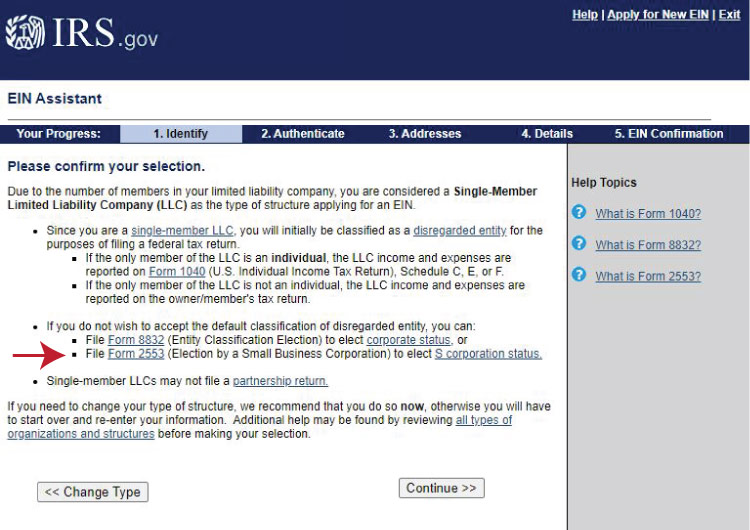How to Start an S Corp in Ohio
Starting an S corporation (S corp) in Ohio can offer tax savings under the right circumstances.
This guide will walk you through the steps required to form an S corp in Ohio and help you determine if it will benefit your business.
Read on to get started and see how an Ohio S corp can help reduce your tax burden.
Pro Tip: Get a free consultation with a tax professional to determine if an S corp is right for you.

Factors to Consider Before Starting an S Corp in Ohio
Before forming an S corp, you have to consider the following factors:
- Is an S corporation the best strategy for your business?
- S corporation restrictions
- Are S corp tax advantages right for you?
Is an S Corporation the Best Strategy for Your Business?
For help with choosing the right structure for your business, visit our Choosing a Business Structure guide.
S Corporation Restrictions
S corps have several restrictions, such as being limited to one class of stock and 100 shareholders. Read our What Is an S Corporation guide for full details.
Are S Corp Tax Advantages Right for You?
An S corporation is a tax designation that can be elected by a limited liability company (LLC) or corporation. With an S corp, business owners are considered employees of the company and must receive a reasonable salary. Since all S corps technically have employees, the s corp must run payroll.
In order to benefit from an Ohio S corp tax designation, your business needs to make enough money to offset payroll expenses. Furthermore, S corps are beneficial for business owners who take large distributions in addition to their salary.
To learn more about the tax advantages of an S corp, read our LLC vs. S corp guide and take a look at our S Corp tax calculator.
Pro Tip: Get a free consultation with a tax professional to determine if an S corp is right for you.
How to Form an Ohio S Corp
There are two main ways to start an S corp:
- By forming an LLC and electing S corp tax status from the IRS when you request your employee identification number (EIN)
- By forming a corporation and electing S corp status from the IRS
We recommend forming an LLC because it’s simpler and more cost-effective.
Not in Ohio? Check out our other How to Start an S Corp guides to learn more.
Recommended: If you have an existing LLC, visit our How to Convert an LLC to S Corp guide.
Steps for Forming an LLC and Electing S Corp Status in Ohio
Starting an Ohio LLC and electing S corp tax status is easy. You can use our guides to start an LLC with the S corp status yourself, or you can hire a service provider like Northwest to guide you through this process.
There are five basic steps to start an LLC and elect S corp status:
Step 1: Name Your LLC
Step 2: Choose a Registered Agent
Step 3: File the Articles of Organization
Step 4: Create an Operating Agreement
Step 5: Get an EIN and File Form 2553 to Elect S Corp Tax Status
Step 1: Name Your LLC
Choosing a company name is the first and most important step in starting your LLC in Ohio.
Be sure to choose a name that complies with Ohio naming requirements and is easily searchable by potential clients.
1. Follow the naming guidelines for an Ohio LLC:
- Your name must include the phrase “limited liability company” or one of the following: LLC, L.L.C., limited, ltd., or ltd.
- Your name cannot contain profanity or words or phrases that are generally considered a slur against an ethnic group, religion, gender, or heredity.
- Your name cannot incorrectly or improperly imply that the business is affiliated with a government agency.
- Your name cannot include any of the following words without prior approval from the Superintendent of Financial Institutions: bank, banker, banking, trust, or words of similar meaning in any other language.
- Your name cannot include the following unless the LLC is registered as a cooperative: cooperative, coop, co-operative, or co-op.
- Your name must be distinguishable from any existing business in the state. This includes Ohio reserved names.
You can also read the Ohio state statute about LLC naming guidelines for more information.
2. Is the name available in Ohio? Make sure the name you want is available by doing a business name search on the Ohio Secretary of State website.
3. Is the URL available? We recommend checking to see if your business name is available as a web domain. Even if you don’t plan to create a business website today, you may want to buy the URL in order to prevent others from acquiring it.
Step 2: Choose Your Ohio Registered Agent
You must elect a statutory agent, also known as a registered agent, for your Ohio LLC.
An LLC registered agent will accept legal documents and tax notices on your LLC’s behalf. You will list your registered agent when you file your LLC’s Articles of Organization.
Many business owners choose to hire a registered agent service. Many of these services will form your LLC for a small fee and include the first year of registered agent services for free.
Ohio Registered Agent Consent to Appointment
Registered agents in Ohio must consent to their appointment by signing the LLC Articles of Organization in physical or electronic form.
Step 3: File the Ohio LLC Articles of Organization
The Ohio Articles of Organization is used to officially register an LLC.
File Your Ohio Articles of Organization
OPTION 1: File Online With the Ohio Secretary of State
File Online– OR –
OPTION 2: File the Articles of Organization by Mail
Download FormState Filing Cost: $99, payable to the Secretary of State (Nonrefundable)
Mailing Address:
Ohio Secretary of State
P.O. Box 670
Columbus, OH 43216
Step 4: Create an LLC Operating Agreement
An LLC operating agreement is a legal document that outlines the ownership and member duties of your LLC.
For more information, read our LLC Operating Agreement guide.
Our operating agreement tool is a free resource for business owners.
Step 5: Get an EIN and Complete Form 2553 on the IRS Website
An EIN is a number that is used by the US Internal Revenue Service (IRS) to identify and tax businesses. It is essentially a Social Security number for a business.
EINs are free when you apply directly with the IRS.
Elect S Corp Tax Status
During the online EIN application, the IRS will provide a link to Form 2553, the Election By a Small Business form.
Visit our Form 2553 Instructions guide for detailed help with completing the form.
This is the form to elect S corp tax status for your LLC:

Ready to start saving on your taxes?
We recommend using a formation service to start your Ohio S corp for you, so you can focus on the things that matter most — growing your business.
Keep Your Ohio S Corp Compliant
Forming your Ohio S corp is a great step toward business success, but it’s important to remain compliant with both state and federal regulations to keep your business in good standing.
File the BOI Report
To comply with federal regulations, all S corporations — whether LLCs or corporations — must file a Beneficial Ownership Information (BOI) report with the Financial Crimes Enforcement Network (FinCEN). This report provides crucial details about the individuals who own or control your business, ensuring transparency and compliance with federal laws.
You can file the BOI report through the FinCEN website.
Open a Business Bank Account
It’s important to keep your business finances separate from your personal accounts to protect your LLC’s liability shield. A dedicated business bank account also is essential for managing your company’s finances effectively and ensuring compliance with state regulations.
For tailored banking options, check out our guide on the Best Banks for Small Business.
Obtain Necessary Business Licenses and Permits
Operating a business in Ohio requires obtaining the appropriate licenses and permits, which vary based on your industry and location. Complying with these requirements is crucial to legally operate your business and avoid penalties.
To find out which licenses and permits you need, refer to our Ohio Business License guide.
Register for State Taxes
All Ohio businesses must register for state taxes with the Ohio Department of Taxation. This includes registration for sales tax, use tax, employer withholding tax, and other applicable taxes. Proper registration is important to comply with state tax laws and avoid penalties.
You can register for taxes online at the Ohio Business Gateway.
Understand Ohio’s S Corp Tax Obligations
Ohio imposes a Commercial Activity Tax (CAT) on businesses, including S corps, which is based on gross receipts. Additionally, S corps must comply with federal tax obligations, including filing IRS Form 1120-S for S corporations. Understanding these tax requirements is important for maintaining compliance.
For more information about state taxes, visit the Ohio Department of Taxation.
Start an Alaska S Corp FAQ
An S corporation (S corp) is a tax designation that an LLC or a corporation can elect.
No. The default taxes for an LLC and taxes for an S corp are not the same.
With an S corp, owners pay personal income tax and self-employment tax on a predetermined salary. They may then withdraw any remaining profits from the business as a “distribution,” which isn’t subject to self-employment tax.
With an LLC, all company profits pass through to the owners’ personal tax returns, and then the owners must pay personal income tax and self-employment tax on the entire amount.
S corp owners are required to earn a “reasonable” salary, which basically means a fair market rate based on the individual’s qualifications as well as their duties and responsibilities at the company. The purpose of this requirement is to prevent S corp owners from paying themselves an artificially low salary in order to pay less self-employment tax.
A distribution is a dividend that a shareholder/owner can take from the business profits that remain after a company pays all of its employee salaries. Shareholders must pay personal income tax on distributions, but distributions aren’t subject to self-employment tax.
LLCs and corporations that operate under a “doing business as” (DBA) name can choose the S corp election.
Ohio is known for some incredible inventions and innovations — from the airplane to the lightbulb. It continues to support business growth in some of the most prominent industries in the nation, including energy, technology, agriculture, processing, automotive, aerospace, aviation, and more. No matter what industry you choose to build your business in, electing S corp status can prove beneficial.
You should always start your new venture in the state where you plan to operate the business. With attractive business incentives, no state income tax, and an affordable cost of living, Ohio is a great place to start a business. By electing S corp status for your Ohio business, you can save money at tax time and put more back into your pocket as a small business owner.